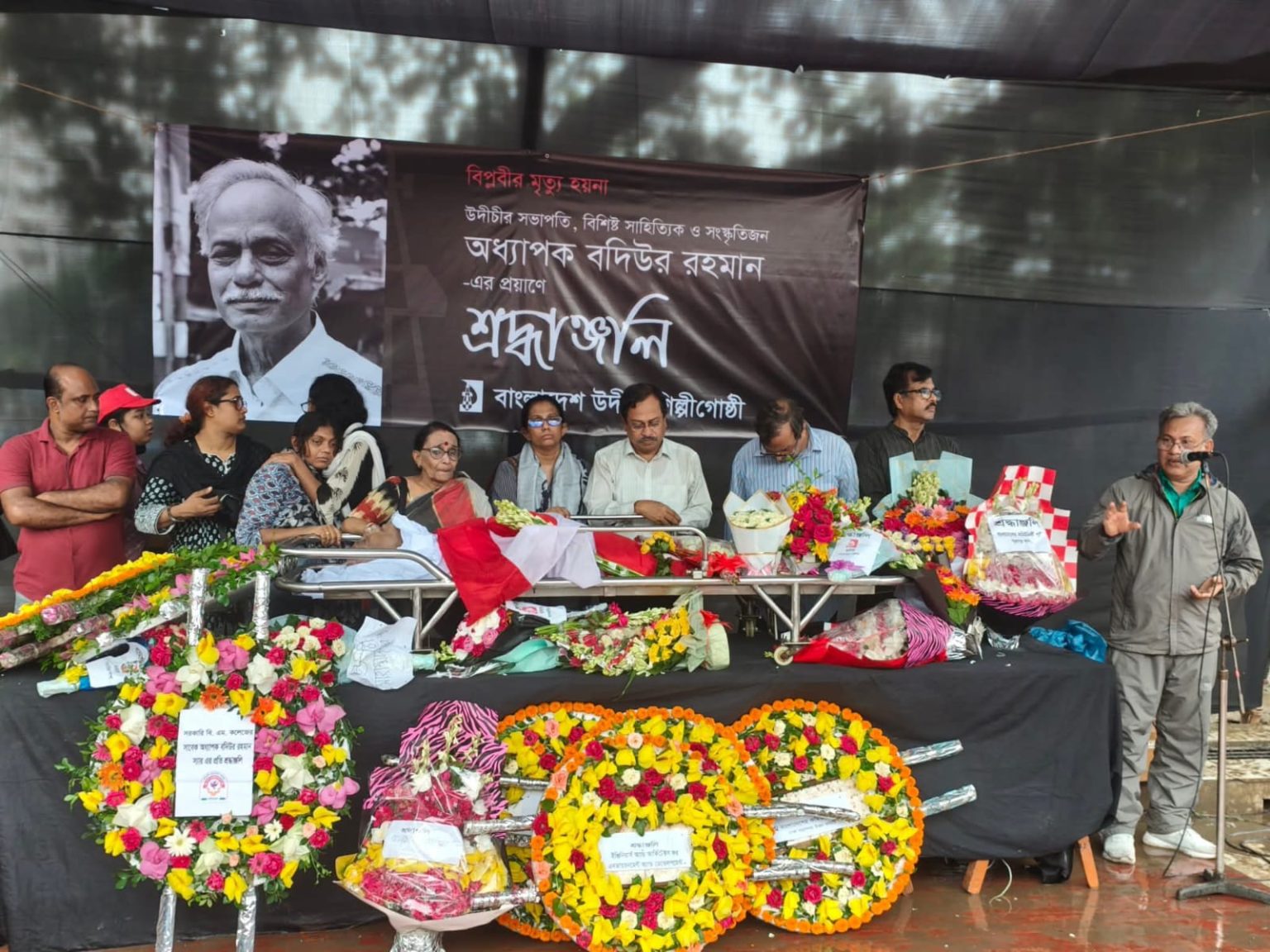Professor Badiur Rahman, the president of Bangladesh Udichi Shilpigoshthi and a renowned researcher, essayist, translator, and literary scholar, passed away at Health and Hope Hospital in Dhaka around midnight on Wednesday.
His death has left Udichi’s members, organisers, and artists in mourning across the country and abroad.
His body was taken to the Central Shaheed Minar on Thursday morning where people from all walks of life paid their respects. Among those who offered tributes were representatives from the Udichi Central Committee, the Communist Party of Bangladesh, NAP-Communist Party-Student Union Guerrilla Force, Bangladesh Students’ Union, Bangladesh Youth Union, Khelaghar, Charan Cultural Centre, the Alumni Association of the Barisal BM College Bengali Department, and various branches of Udichi Dhaka Metropolitan Chapter.
Udichi’s general secretary Amit Ranjan Dey said told the gathering that Professor Badiur Rahman remained actively engaged in the organisation’s work until the day before his death.
“He was always a true guardian, standing firm in every internal or external crisis. Despite no major health complications, his sudden demise has left his comrades in shock. Though he is no longer with us physically, the ideals he sowed will continue to guide Udichi’s struggle for a non-communal, secular, and egalitarian society,” he said.
Other speakers included Communist Party president Shah Alam, Liberation War Museum trustee Mofidul Hoque, Professor MM Akash, and Udichi vice president Mahmud Selim. Professor Rahman’s eldest daughter Supa Sadia spoke on behalf of the family.
The tribute ended with renditions of Udichi’s organisational anthem, Aguner Poroshmoni, and The Internationale.
Following the tribute, Professor Rahman’s body was taken to Barisal. There, tributes will first be paid at the Udichi district office, followed by a civic tribute at the Barisal Central Shaheed Minar.
As a freedom fighter, he will be accorded a guard of honour before being laid to rest at Barisal in the evening.
A Life of struggle and contribution
Born in Barisal in 1947, Professor Badiur Rahman was widely known as a cultural organiser, researcher, and essayist. He left his teaching profession in 1971 to play a key role in organising the Liberation War as a member of the NAP-Communist Party-Student Union guerrilla force.
After independence, he returned to teaching and joined Udichi in 1972. He served in numerous leadership roles at both local and national levels, including over three decades as vice president of the central committee of Udichi. On 4 June 2022, he was elected president for the first time and was re-elected during Udichi’s 23rd national conference on 20 June 2025.
His key literary and research works include Sahityer Swarup, Chhanda Alankar Rasatatva, Banglar Charan Mukunda Das, Rabindrajiboner Ashi Bochor, Sahitya-Sangya Abhidhan, and Paschatya Sahitya Tattwa. He also edited landmark collections such as Satyen Sen Rachanabali (Vols 1–8), Ashwinikumar Rachana Sangrah, Mukunda Daser Joto Lekha, and Michael Madhusudan Dutter Prohoshan.
His notable translations include Aristotle’s Poetics, Longinus’ On the Sublime, Horace’s Ars Poetica, Plato’s poetic theories, Khalil Gibran’s The Prophet, The Madman, The Sand and Foam, and Machiavelli’s The Prince.
After retiring from teaching in 2004, he remained a mentor to students, literary enthusiasts, and progressive cultural activists. His death marks the loss of a guiding light for Udichi and the broader progressive cultural movement in Bangladesh.


